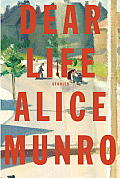Books |
Alice Munro: Dear Life
By
Published: Sep 24, 2020
Category:
Fiction
I did not go home for my mother’s last illness or for her funeral. I had two small children and nobody in Vancouver to leave them with. We could barely have afforded the trip, and my husband had a contempt for formal behavior, but why blame it on him? I felt the same. We say of some things that they can’t be forgiven, or that we will never forgive ourselves. But we do — we do it all the time.
These are the final words in “Dear Life.” I wish I could judge this book against her 14 other collections of stories, but the truth is, I’ve never read her until now, and I wouldn’t have read these 13 stories unless I’d read some raves and read snippets and realized — yet again — that I’ve been a damn fool all these years.
Cynthia Ozick has said of Munro: “She is our Chekhov and is going to outlast most of her contemporaries.”
That’s high-toned praise, just so you know how respected Munro is. And then there are the prizes. So many prizes.
But who reads for “literary” reasons?
Not me. I read — especially fiction — because I want to know how it feels to be someone else. To think like someone else. To have someone else’s adventures, crises, romances and triumphs. Because, for an hour or a day, I want out of my life.
By those measures, “Dear Life” was the book of the year for me. Feel free to take my word, stop reading right now, buy it and get started on a powerful reading experience. [To buy the paperback from Amazon, click here. For the Kindle edition, click here.]
When I love a book, I like to say that I started reading and didn’t stop until I was done. Not with these stories. You can’t. One a day is a full meal, and then you have to go away and process it. Because these aren’t really stories — they’re compressed novels, entire lives told in 30 pages. Other writers do something like this, but I can’t think of another who does it within the apparent frame of a traditionally told story.
For example, the first story begins like this: “Once Peter had brought her suitcase on board the train he seemed eager to get himself out of the way.” Peter, we learn, is Greta’s husband — and this is the last we’ll see of him. This is a woman’s story, the story of a young poet, traveling with her daughter. Something happens on that train, and it’s sexy and scary and not anything you expect — and then, at the end, something else happens, something you thought was not at all likely. It happens fast, and it hits you hard, and there’s no way you rush on to the next.
The next story also starts with a train trip. With good reason: Munro is Canadian. She married young to escape her father’s failing mink farm and her mother’s Parkinson’s, and she had children right away, and she wrote and wrote, pushing her kids away when they interrupted her. All this took place a long time ago, when small town life was a world and women who broke the rules were notorious in that world. Naturally Munro would be drawn to characters who have a dream, who want more, who have no roadmap or mentors and have to figure it out themselves. As she writes: “It would become hard to explain, later on in her life, just what was okay in that time and what was not.”
A young woman goes to teach in a remote sanitarium — so remote she describes the sky as an “immense enchantment.” She trades one small world for another. Romance with the doctor? You can see it coming. What happens after? Pure surprise. Two sisters, a gravel pit filled with water. A daughter of liberals spending a year with her hard-ass uncle. An unmarried woman, having an affair and dealing with blackmail. A woman needs to get a prescription filled. An elderly couple discusses a joint suicide — and then his old lover shows up.
There’s a story about a policeman with a sick wife. He devotes himself to her, even moves to the city so she can get better care. At last she dies. And he has to walk out of the hospital: “He’d thought that it had happened long before with Isabel, but it hadn’t. Not until now. She had existed and now she did not… And before long, he found himself outside, pretending that he had as ordinary and good a reason as anybody else to put one foot ahead of the other."
The lives of little people. We see them on the street, and, if we are curious, we wonder about their lives. Alice Munro does our homework for us — she inhabits those lives. Her judgments are sure. And… human.
BONUS VIDEO


